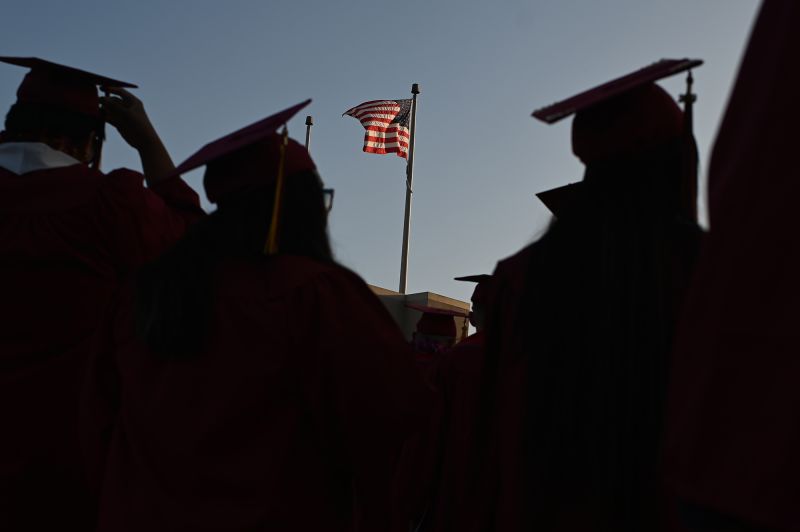
Six Republican-led states sued President Joe Biden on Thursday in an effort to block his student loan forgiveness plan from taking effect.
The lawsuit was filed in a federal court in Missouri by state attorneys general from Missouri, Arkansas, Kansas, Nebraska and South Carolina, as well as legal representatives from Iowa.
“In addition to being economically unwise and inherently unfair, the Biden Administration’s Mass Debt Cancellation is another example in a long line of unlawful regulatory actions. No statute permits President Biden to unilaterally relieve millions of individuals from their obligation to pay loans they voluntarily assumed,” Nebraska Attorney General Doug Peterson’s office said in a news release.
Earlier this week, a public interest lawyer who is also a student loan borrower, sued the Biden administration over the student loan forgiveness plan, arguing that the policy is an abuse of executive power and that it would stick him with a bigger state tax bill.
The White House did not immediately respond to a request for comment.
How Biden’s plan will work
Under Biden’s plan, individual borrowers who earned less than $125,000 in either 2020 or 2021 and married couples or heads of households who made less than $250,000 annually in those years will see up to $10,000 of their federal student loan debt forgiven.
If a qualifying borrower also received a federal Pell grant while enrolled in college, the individual is eligible for up to $20,000 of debt forgiveness. Pell grants are awarded to millions of low-income students each year, based on factors that include their family’s size and income and the cost charged by their college. These borrowers are also more likely to struggle to repay their student debt and end up in default.
The administration is expected to roll out the first wave of student loan forgiveness in October.
The Congressional Budget Office estimated this week that Biden’s plan could cost the government $400 billion but warned that the estimate relies on several assumptions and is “highly uncertain.”
Estimating the cost of student debt forgiveness is complicated because loans are generally paid back over several years. The White House argues that the CBO’s estimate should be looked at over a 30-year time frame.
Untested legal waters
Biden announced the forgiveness plan in August, after facing mounting pressure from Democrats to forgive some student loan debt. Senate Majority Leader Chuck Schumer and Massachusetts Sen. Elizabeth Warren repeatedly called on the President to cancel up to $50,000 in student loan debt per borrower.
But canceling federal student loan debt so broadly is unprecedented and, until now, has yet to be tested in court. Biden initially urged Congress to take action to cancel some student debt, rather than wade into a murky legal area himself, but Democrats don’t have the votes to pass such legislation.
In a Department of Education memo released in August, the Biden administration argued that the Higher Education Relief Opportunities for Students Act of 2003 – or Heroes Act – grants the Education Secretary the power to cancel student debt to help address the financial harm suffered due to the Covid-19 pandemic.
The Heroes Act, which was enacted in the wake of the September 11 terrorist attacks, “provides the Secretary broad authority to grant relief from student loan requirements during specific periods,” including a war, other military operation or national emergency, according to the memo.
The lawsuit filed Thursday argues that the Heroes Act does not grant the President such broad authority.
What happens next
Additional lawsuits challenging Biden’s student loan forgiveness plan could be forthcoming. Arizona Attorney General Mark Brnovich, a Republican, has said he is working on developing the best legal theory to sue the administration over the action.
A conservative advocacy group called the Job Creators Network is also weighing its legal options, planning to file a lawsuit once the Department of Education formalizes the student loan forgiveness plan next month.
But some legal experts are skeptical that a legal challenge to Biden’s student loan forgiveness plan could be successful.
Abby Shafroth, staff attorney at the nonprofit National Consumer Law Center, previously told CNN that she believes the merits of the Biden administration’s legal statutory authority are strong and that it’s unclear who would have legal standing to bring a case and want to do so. Standing to bring a case is a procedural threshold requiring that an injury be inflicted on a plaintiff to justify a lawsuit.
If the standing hurdle is cleared, a case would be heard by a district court first – which may or may not issue a preliminary injunction to prevent the cancellation from occurring before a final ruling is issued on the merits of the hypothetical case.
Several recent US Supreme Court decisions have touched on executive power, limiting the federal government’s authority to implement new rules. While the Supreme Court takes up a small number of cases each year, lower courts may look at what the justices have said in those cases when assessing the Department of Education’s authority.
This story has been updated with additional information.
from U.S. - Latest - Google News https://ift.tt/0owlOIr
via IFTTT
Tidak ada komentar:
Posting Komentar